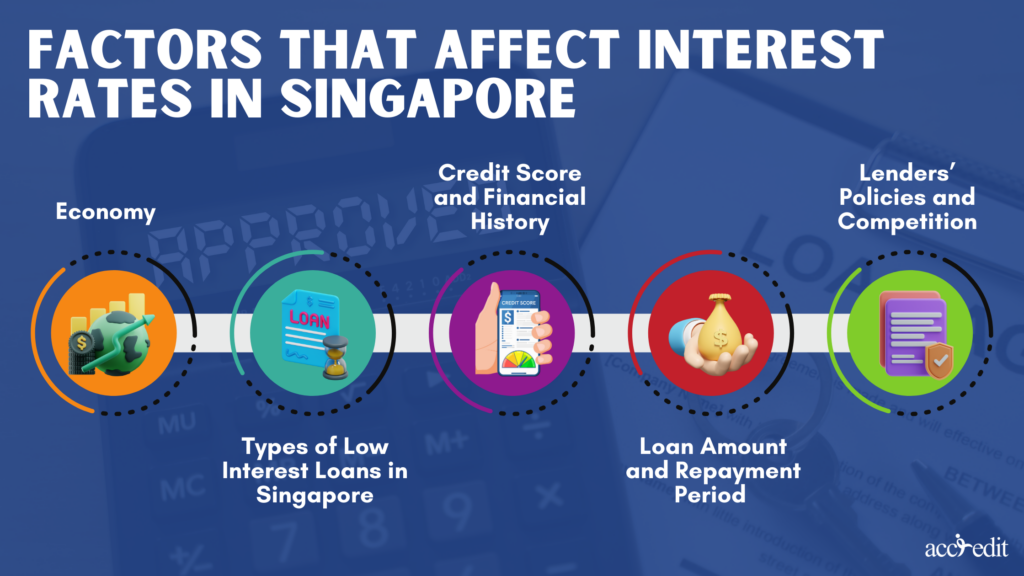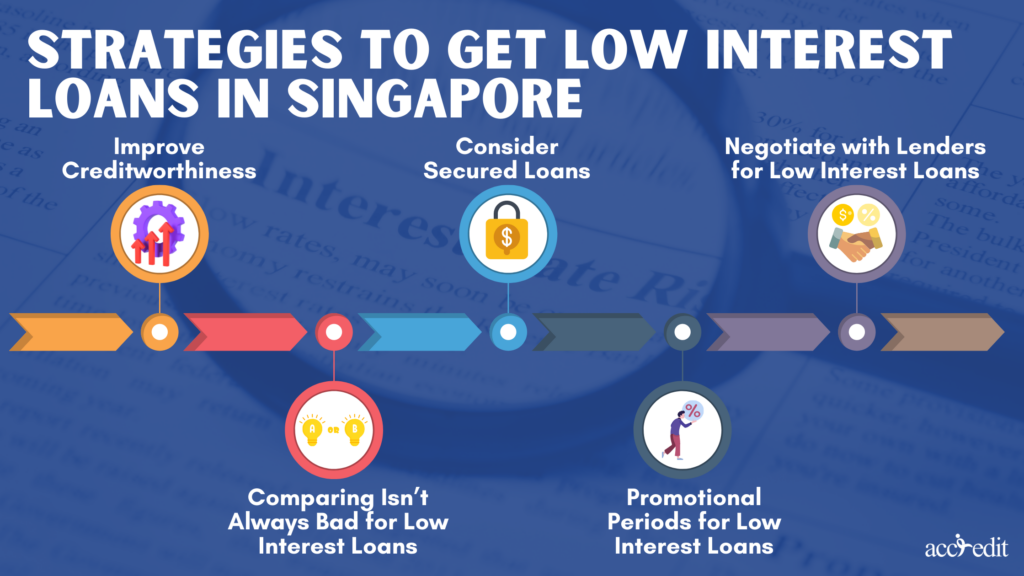
As Asia’s financial hub, Singapore’s financing industry is brimming with essential loan products borrowers may apply for. Yet, you, as a borrower, are seeking, aside from the accessible money, the possibility of obtaining low interest loans.
Getting a loan with low-interest rates is a crucial aspect that can help you avoid undue financial pressure.
Interest rates can be fixed or variable. However, the final interest rate is mainly determined by various critical factors such as loan type, credit score, and history. Also, the loan amount is considered, along with the lender’s policies and competition.
The main objective of this article is to help you get a lower-interest loan in Singapore. This’ll include interest rate estimates to give you a better scope in comparing the differences between lenders and some incredible strategies that guarantee a lower-interest loan in Singapore.
Factors that Affect Interest Rates in Singapore

In Singapore, the country utilises either the Singapore Interbank Offered Rate (SIBOR) or Singapore Overnight Rate Average (SORA) to assess whether to increase interest rates. The basis is within the historical tandem of interest rates established by the US Federal Reserve.
It’s acknowledged that Interest rates are considered critical components associated with loans. As a borrower, you must understand specific factors affecting the loan interest, allowing you to assess when it’ll be high or low.
So, what are the following among the factors that can influence a loan’s interest rate?
1. Economy
Singapore’s current economic status will have a massive impact on a loan’s interest rate. The loan’s interest is usually higher when the country’s economy is stable. If a significant shift occurs in the economy, specifically economic downturns, the interest rates offered are typically lower.
For instance, during the onset of COVID-19, there was a decrease in most interest rates ranging from 0% to 0.25%. The objective of keeping it at rock bottom is to encourage economic activity.
A perfect occurrence wherein the economic status reeled down the average rate for home loans during the COVID period. It was set at 1.8%. This triggered an incredible bargain experience for investors and homebuyers and refinancing among homeowners.
2. Types of Low Interest Loans in Singapore
Loan options in the country are extensively varied. As a borrower, it ensures you obtain the financial assistance to meet your demands and needs.
As there are different types of loan products in Singapore, so is the diversity of its interest rates. For one, the country has two specific branches of the loan: secured and unsecured.
Borrowers must deliver properties, vehicles, or assets to obtain secured debt. Because of the reduced risk probabilities from the collateral provided, the borrowers tend to acquire low interest loans.
Unsecured debts in Singapore don’t require any form of collateral from the borrowers. Thus, it could carry a much higher interest rate because of the higher level of loan default probability.
Here are a few notable secured and unsecured lower-interest loan choices a borrower can apply for in the country:
Personal Loans:
Personal loans are the most popular unsecured loans in Singapore. Many people prefer to apply for a personal loan as it’s flexible. For instance, if you need emergency funds for unexpected expenses, you may use them from banks and licensed moneylenders in Singapore.
Even when you must repair homes or cars, need travel funds, or consolidate your debts, you can rely on the funds accessible for a personal loan.
Traditional banks impose interest rates of 3.88% and up per annum. Licensed moneylenders grant a personal loan for a 1% to 4% monthly interest rate.
Housing Loans:
The housing loan interest rate often varies on the tenure and overall amount. Yet, the current secured housing loan interest rate would range between 1.25% to 2.5% per annum.
Unsecured home loan interest rates in the country would generally hit from 3.5% to 4.5% per annum from banks and other financial companies. Licensed moneylenders in Singapore are forced to impose a maximum 4% per month interest rate.
Car Loans:
Car loans are primarily secured loans, which significantly help those who plan to buy or repair their vehicles. As a secured debt, the car or vehicle will serve as collateral with a low-interest loan rate ranging from 1.68% up to 2.78% with a seven-year tenure.
Unsecured car loans are accessible in the country, with interest rates between 3.5% and 4.5% per annum. The loan terms are usually shorter, lasting up to five years, with a definitively lower loan amount attainable.
But, you have to be mindful regarding the type of car they’ll apply for the loan. The interest rate would fluctuate depending on the car’s make, especially if it’s a new or second-hand vehicle.
Fixed Deposit Secured Loans:
It’s a recognised loan option for those who wish to secure low-interest rates. Your fixed deposit account will act as collateral, thus securing the loan and ensuring the lender of guaranteed repayment.
In Singapore, a fixed deposit secured loan’s interest may start at 1.5% to 2.5% p.a. Its tenure can be between one year and could last up to five years. The achievable loan amount can reach up to 90% of your fixed deposit amount, with a much lower interest rate due to the collateral provided.
The final interest rate will primarily be based on the loan amount, and tenure may last one year to five years.
Before applying for a loan, review and assess whether it’s a secured or unsecured debt. Unsecured have higher interest rates compared to secured loans. Aside from different loan types, you are awarded lower interest rates depending on your credit score and financial history.
3. Credit Score and Financial History
Lenders in the country always acknowledge your credit history and score. It’s among the primary factors that’ll assist them in deciding whether the debtor is eligible for a much lower interest rate. Good to excellent credit scores of 1800 to 2000 and above usually get low interest loans in Singapore.
Additional factors that lenders consider include the low debt-to-income ratio, signifying they manage your debt level well compared to your income. Good repayment history proves a debtor’s commitment to your repayment schedules. Stable employment and income boost your creditworthiness for a lower loan interest rate.
4. Loan Amount and Repayment Period
Smaller loan amounts with shorter repayment periods could influence lower interest rates for the loan products the debtor applied for.
For instance, you’ll take a S$10,000 personal loan with a one-year repayment period. The interest rate for this is much lower than a S$20,000 personal loan with a two-year repayment term. Opting for secured loans by collateral boosts more chances of obtaining a lower interest rate.
Whether secured or unsecured, the loan amount and repayment period must be considered carefully. It’s imperative to make sure these two are realistic and have the financial capacity, and are manageable that fit your monetary situation to avoid missed payments and fees.
5. Lenders’ Policies and Competition
Also, lenders’ policies and their competitors have a significant pull that will help you obtain a much lower interest rate for loans in Singapore.
For one, the country’s banks, financing companies, and licensed moneylenders have high competition. Utilising this information while researching and comparing each lender will help you find the best and lowest interest rate option for your preferred loan.
Some lenders provide lower interest rates to specific groups of borrowers, especially those with good to excellent credit scores or who have been diligent and committed clients for the longest time.
You must evaluate these specific factors on getting loans with lower interest rates in Singapore are bound to obtain precisely what you want. But particular strategies may increase the probabilities to ensure a higher success rate.
Strategies to Get Low Interest Loans in Singapore

Loans can become a very responsibility due to the laws and regulations imposed on them. Yet, most problems that arise from loans are the lack of consistency and discipline in fulfilling one’s obligations.
If you’re interested in obtaining lower interest rates, then here are some strategies to practise that’ll help you gain success:
Improve Creditworthiness

Singapore’s financing and moneylending industry takes creditworthiness seriously. It’s the method they’d use to analyse, review, and evaluate a debtor’s capacities and reliability of repaying the money they owed.
So, it would be best if you always practised paying your bills on time, especially your current loans. In addition, individuals who maintain a low credit utilisation ratio may also be awarded a better creditworthiness result.
It’s a notable strategy worth pursuing even when you’re not ready to take out a new loan.
Comparing Isn’t Always Bad for Low Interest Loans

You may have heard people discouraging others from comparing situations in life because it’ll cause more damage than good. But it’s always more motivated to seek the best way of getting lower-interest loans in Singapore.
Comparing loan offers from different lenders assists borrowers immensely in obtaining lower interest rates.
What factors must be compared for this strategy?
It should be the lenders’ interest rates, repayment terms, fees, and other terms and conditions. Through a rigorous and meticulous comparison, the low-interest loan rate is within reach.
Consider Secured Loans

Between a secured and unsecured debt, secured loans backed with collateral are usually the best choice if the main goal is to obtain a lower-interest loan in the country. The collateral easily seals the application as it secures the loan itself.
Yet, before you surrender your properties or vehicles, it’s essential that they’ve assessed your financial situation and can commit to the repayment fees and period. It also ensures that the collateral won’t be lost and may be used for future purposes.
Promotional Periods for Low Interest Loans
In Singapore, promotional periods for loans are popular too. It’s the seasons wherein lenders in the country proffer periods wherein they’re granting lower interest rates on specific types of loans.
It’s good to watch for these types of promotions as it’s worth taking advantage of if a debtor’s keen on getting a low interest loan. Promotional periods for loans mostly happen during festive seasons, anniversary promotions, and especially during year-end.
Negotiate with Lenders for Low Interest Loans
Negotiating with the right lender goes a long way for you as a borrower, specifically if they already have a good credit score and repayment history to back up your plan.
But you cannot do this simply on a whim. You must be prepared with your proposal before officially engaging with a lender in Singapore.
First, you must compare lenders, mainly focusing on interest rates, fees, and terms of various lenders, to better understand what’s accessible for you. Next is knowing your creditworthiness, strengthening the negotiation’s favour.
Preparing the budget on income, expenses, and existing debts and dues will assist you in assessing repayment capabilities and negotiating the loan that fits your finances best. Ensuring a clear repayment plan will show diligent responsibility for the loan and encourage better negotiation outcomes.
Interest rates and other loan terms and conditions can be negotiated too. You must do it correctly by explaining and proving you’re a good loan candidate and counter-offering lower interest rates and favourable terms.
If the negotiation doesn’t go as planned, you must be prepared to leave. There are many lenders in Singapore, and sealing the deal might be better elsewhere.
Low Interest Loan in Singapore is Worth the Hassle
For an individual who desires to gain the best options in life, good outcomes don’t happen by simply waiting for them to arrive. It’s the same concept as seeking a low interest loan in Singapore.
You have to be proactive because the country has many lenders. But, each bank, financing company and licensed moneylender offer different loans, interest rates, fees, and terms and conditions. By filtering out the essential factors, you can crack which lenders would proffer low-interest loans with high probabilities.
Boosting your creditworthiness requires a lot of focus and diligence to achieve a good credit score. Strategising the best negotiation may take some time to perfect.
A low-interest loan gives you many advantages, such as reduced total cost. You only have to worry about lower monthly payments meaning it’ll be easier to manage finances and acquire more disposable income. Your financial health improves as you have extra money for future use or savings.
Thus, applying for a low-interest loan can be a hassle. But, every hassle is worth it when you acquire it and gain many advantages.

